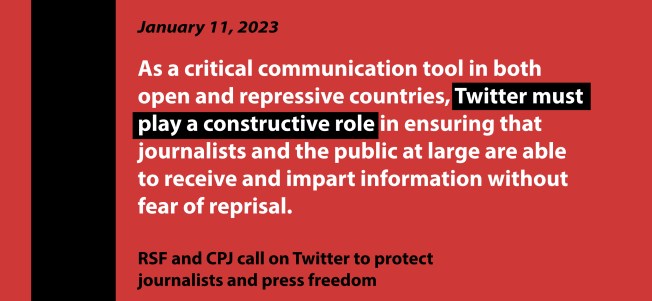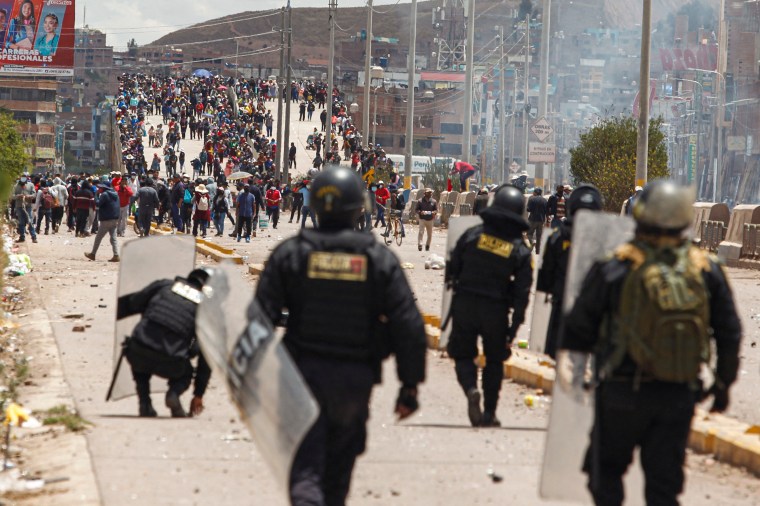The Torch is a weekly newsletter from the Committee to Protect Journalists that brings you the latest press freedom and journalist safety news from around the world. Subscribe here.
In Peru, more than 70 journalists have been harassed and attacked since anti-government protests broke out in December, following the impeachment and arrest of former President Pedro Castillo.
In one incident on January 7, police officers threatened to kill Aldair Mejía, a photographer for the Spanish news agency EFE who was covering anti-government demonstrations in the city of Juliaca, telling the journalist they would “blow your head off” if he continued taking photos of the protests. Officers later shot Mejía in the leg with pellets, breaking his right tibia.
Also in Peru, two journalists were injured in a hit-and-run attack near the northern town of San Pablo early in the morning of January 5. One of those journalists told CPJ he believed they were targeted for their reporting on alleged corruption and mismanagement by local officials.
In Brazil, on January 8, supporters of former President Jair Bolsonaro attacked and harassed journalists while storming government buildings in a violent riot. At least 12 journalists covering the riots reported being threatened, punched, kicked, or had their equipment broken or stolen.
“During this critical time for Brazilian democracy, journalists have a crucial role to play in informing the public,” said Renata Neder, CPJ’s Brazil representative. “Authorities must swiftly and thoroughly investigate all attacks on the press and ensure journalists can report safely and without fear of harassment.”
- Turkey convicts 10 people connected to murder of journalist Güngör Arslan, including gunman
- CPJ condemns November detention of Wall Street Journal reporter in Arizona
- CPJ marks January 6, a dark anniversary for democracy and press freedom in the U.S.
- Texas joined Iowa, Kansas, and Utah in barring reporters from state Senate floors
- Iranian journalists face long prison terms, lashes, and harsh restrictions over protest coverage. As of January 9, CPJ has documented 88 journalists arrested since the beginning of the protests
- Journalists harassed, robbed by gunmen in Culiacán amid clashes between cartel and Mexican security forces
- Myanmar sentences eight journalists to years in prison, releases six others
- Belarus orders Russian journalist Yekaterina Yanshina detained for 15 days
- Benin journalist Virgile Ahouansè held for two days, charged with spreading false news
- South Sudan security forces detain six state media employees
- Ugandan constitutional court strikes down criminalization of “offensive communication”
Spotlight

On January 11, CPJ and Reporters Without Borders (RSF) sent a joint letter to the Twitter executive team to express concern over the rapid deterioration of basic human rights standards and responsible governance on the platform.
This deterioration is contributing to a hostile environment for journalists, which could put them in physical danger and threaten the public’s right to access important information.
Read the full letter on CPJ’s website.
On January 6, CPJ, RSF, and 76 journalists and press freedom organizations called for the release of Senegalese journalist Pape Alé Niang, who was on a hunger strike which deteriorated his health. The joint letter (in French) expressed concern about the decline in press freedom that has threatened Senegal’s democratic credentials in West Africa, and urged the government to decriminalize press offenses and enact a law granting access to information.
On January 10, Niang was released under tight bail conditions—he is barred from speaking about his case or traveling. These conditions “lay bare authorities’ intentions to constrain the press,” CPJ Africa Program Coordinator Angela Quintal said.
Niang was arrested on November 6, 2022, and faces five years in prison under anti-state and false news charges if convicted. His arrest made Senegal appear on CPJ’s 2022 annual prison census of jailed journalists, only the second time Senegal appeared on the census since it began in 1992.
- Journalism, media, and technology trends and predictions 2023 — Nic Newman, Reuters Institute for the Study of Journalism
- Journalists say Elon Musk needs to reinstitute monitoring of Twitter — Voice of America
- Hopes rise for press freedom in Tanzania as number of censured journalists falls — Caroline Kimeu, The Guardian
- World Report 2023 — Human Rights Watch
- Is Twitter dying? And what would that mean for journalism? — Mathew Ingram, Columbia Journalism Review
- World Press Freedom Day 30th anniversary recentering freedom of expression as a driver for all other human rights — UNESCO
Do you have an Amazon Alexa-enabled device? Enable CPJ's flash briefing skill to stay up to date with the latest press freedom news from around the world.
